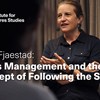allowing

Maja Fjaestad: Crises management and the concept of “following science”
Maja Fjaestad was state secretary for health in Sweden during the Covid 19 pandemic. Recently she published the book (with Emma Lennartsson) “Mitt i krisen” (In the Midst of the Crisis) (Volante, 2024
Following the Science: Pandemic Policy Making and Reasonable Worst-Case Scenarios
LSE Public Policy Review, 1(4), p.6. 2021 Abstract The UK has been ‘following the science’ in response to the COVID-19 pandemic in line with the national framework for the use of scientific advice in as

Research seminar with Maja Fjaestad: Post-pandemic reflections on leadership and preparedness: Crises management and the concept of “following science”
Venue: Institutet för framtidsstudier, Holländargatan 13, 4th floor, Stockholm, or online.Research seminar with Maja Fjaestad, IFFS researcher, expert coordinator at the Center for Health Crises at KI
Who Approves of Gossip, Ostracism, and Confrontation Following Norm Violations? A Cross-Cultural Test of Gender Stereotypes
Social Psychology Quarterly Abstract Existing research and popular culture suggest that women are more approving of gossip. But are they? This research note uses two studies to ask whether gender stereo
The transparency imperative: The need for model documentation for engaging with public policy following the EU AI Act
Conference paper, Annual Modeling and Simulation Conference (ANNSIM'25) Abstract The application of Agent-Based Modeling and Simulation (ABMS) has few established guidelines and oftensuffers from insuffdifferent types of model documentation in light of the European Union’s AI Act (AI Act). Our analysisreveals that best practices are often implemented together but ultimately reinforce the pre-existing viewthat ABMS frequently lacks adequate model documentation. This deficiency hinders evaluability, makingit difficult to conduct quality assurance prior to application and meaningful evaluation post application.We propose a framework that highlights the importance of different types of model documentation and theattributes they enable, which are valuable to both modelers and policy actors, albeit for different reasons.The AI Act provides a valuable opportunity to improve model documentation. By proactively developingand establishing guidelines, we can stay ahead of emerging legal requirements.
Incommensurability, the sequence argument, and the Pareto principle
Philosophical Studies Abstract Parfit (Theoria 82:110–127, 2016) responded to the Sequence Argument for the Repugnant Conclusion by introducing imprecise equality. However, Parfit’s notion of imprecise degrees of incommensurabilityeveryone
Degrees of Incommensurability and the Sequence Argument
In: Mosquera, J. & O. Torpman (ed.),Studies on Climate Ethics and Future Generations vol. 6. Working Paper Series 2024:10–17 Abstract Parfit (2016) responded to the Sequence Argument for the Repugnan

Point of you
Developing a new format for research communication, where performative elements and the participants' own experiences serve as the starting point for discussion.
Anna Stilz: Climate displacement and territorial justice
Plats: Institutet för framtidsstudier, Holländargatan 13 in Stockholm, or online OBS! This seminar is part of a workshop and therefor takes place on a different weekday and time than usual. Research semi

Digital development and educational outcomes in Sub-Saharan Africa: A recipe for inclusive development or deepening divides?
A project on how the spread of digital information and communication technology in Sub-Saharan Africa has affected educational outcomes and inequalities.








